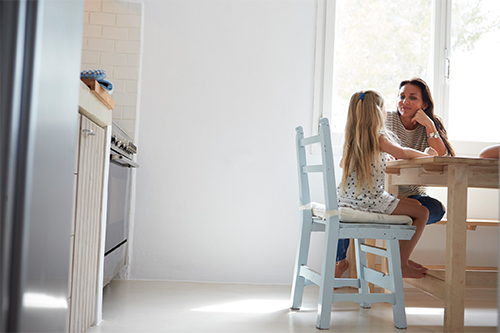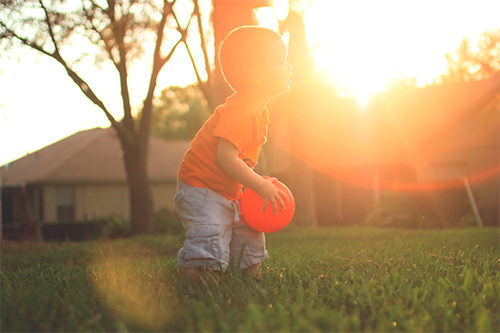Wondering why your teen is on Instagram instead of studying for an upcoming test? Frustrated with a kid who spends more time playing video games than practicing for the upcoming game? Parents want their kids to reach their full potential, and sometimes it all comes down to motivation.
There’s a lot of conflicting advice out there about the best ways to motivate kids and just how involved parents should be. Some argue that parental involvement is paramount. A study out of the University of Essex found that girls with parents who nag them are more successful than those who have hands-off parents. But the case for avoiding so-called “helicopter parenting” — over-involvement in every aspect of a child’s life — is equally compelling, with some research suggesting that helicopter parenting can actually impair a child’s emotional and cognitive development.
So how does a parent find the happy medium? We asked experts what parents can do to raise motivated kids. Here are their top five recommendations.
1. Set Goals

The experts agree that setting goals is key to having motivated kids — they need something to work toward. Parents should talk with kids about their hopes and dreams, especially those that go beyond academics, urges Jessica Lahey, teacher and author of “The Gift of Failure: How the Best Parents Learn to Let Go So Their Children Can Succeed.” That information helps kids identify and set goals that they are motivated to achieve.
Dr. Rebecca Nelson, a developmental/behavioral psychologist for kids at NorthShore University HealthSystem, agrees but emphasizes that, while parents are taking a back seat, they should ensure that the goal set is “within the child’s sphere of interest and competence.”
Once their goals are identified, “then we as parents can talk to them about what they need to do to achieve the goals that you as parents already know mean something to them. That’s our leverage,” Lahey says.
“Certain things will be uncomfortable for them, like asking for a job or letters of recommendation. Parents just telling kids to do those things is not going to work, but those tasks become less onerous when you know it’s part of a larger goal,” she says.
Nelson says that in addition to talking with kids about goals, parents should make sure kids have the opportunities and resources in place to reach them. It’s helpful to start with smaller, achievable goals rather than large ones that quickly become overwhelming. She cautions that if a child experiences too many disappointments, over time they become chronically frustrated and resentful.
“Ideally, help kids start with activities that they want to do and are fairly good at, because they need the early successes to build self-efficacy and the ‘I can do this’ belief. That then translates to ‘now what else can I do’ and they dive in to developing other competencies,” says Nelson.
Sometimes kids don’t get something done not because of lack of motivation, but lack of knowledge of how to do something. While the goal is for kids to become self-sufficient, chances are that your kids, even if they’re older, need some help getting to that sweet spot.
“Teens still need a lot of hand holding,” says Nelson. There’s a difference between helping kids reach goals and helicopter parenting.
2. Let Kids Discover Their Passions

Lahey notes that for kids to set meaningful goals, they need to know themselves and discover their passions. Kids are far more willing to work on things that excite them. Parents should also allow for passions to grow, evolve, and change and make sure that they come from the child’s interests, and not the parents.
Pursuing a passion is not only a way for children to develop self-motivation, but it’s also great for their brain, according to William Stixrud, Ph.D. and co-author of “The Self-Driven Child: The Science and Sense of Giving Your Kids More Control Over Their Lives” with Ned Johnson. He explains that when kids work hard to get better at an activity that deeply engages them, “they are ‘sculpting’ a brain that enjoys and is used to a mental state the combines high focus, high effort, high energy — and low stress, which is the optimal state for learning and performance.”
3. Encourage Down Time

To discover passions and then have the energy necessary to pursue them, kids need down time. That can be challenging when kids are scheduled from sunrise to sunset, but the experts say that time spent “doing nothing” may actually be essential for children to find their own internal motivation.
“When a kid has time to just daydream and let their mind wander, that’s where real creativity lies and where self-knowledge starts to happen,” Lahey explains.
As an advocate for “radical downtime” for kids, Stixrud agrees, noting that downtime is essential so that “their brains and bodies can restore and refresh themselves.”
“Extensive research has found that having time to simply let your mind wander is related to increased creativity and more effective problem solving, indicating that having some unfocused down time is absolutely not a waste of time,” says Stixrud.
4. Make Tasks Relevant
“Why?” is a question asked well beyond the toddler years, and when kids understand the reason why they need to accomplish certain tasks, they are more likely to get them done.
“We’re asking kids to find motivation when they just want to hang out,” says Jason Price, licensed marriage and family therapist and co-director of Affiliates in Counseling, which includes a new adolescent center in Northbrook. He reminds parents that the brain is not fully formed until approximately age 25. Because of that, he says, “you have to find a way to make it meaningful for them.”
“When there are things they are not motivated to do, try to make it relevant and important to them in some way. That often means figuring out what the long-term plan is and illuminating the connection between today and their goals for the future,” says Lahey.
While parents can help kids connect the dots, if kids don’t seem to be listening, Price suggests calling in the help of another adult. Mentors, coaches, counselors, and other relatives can all offer perspective and insight that resonate with kids in a way that information from their parents may not. (Sorry, Mom and Dad.)
Nelson says that parents can help with gentle reminders of the “why” when a child’s motivation starts to decline, which is normal and can be countered with what she calls “positive nudges” that “affirmatively acknowledge that specific behavior they’re engaging in to reach goal.”
Extrinsic motivators, or bribes, may be a way to make a task relevant in the short-term, but Lahey notes that there is much research showing that it isn’t effective in the long-term. Price suggests that parents look to rewards that kids have in their day-to-day to life. “There’s a natural order to things, such as getting work done before you get to hang out with friends or get screen time,” he says. He recommends setting up a system in which kids can earn a privilege, as opposed to the power struggle of taking something away.
5. Normalize Failure
Success is rarely guaranteed, and the fear of failure looms large in the minds of children and adolescents. Parents can take steps to normalize failure so that it doesn’t extinguish their kids’ motivation when it happens. Even better, they can help kids learn how to use it as a motivator. That includes discussing times when parents and famous people kids look up to have failed, and how they overcame it to ultimately be successful.
Nelson says her kids told her that hearing adults say “Just try your best and it will all work out” was frustrating. From their perspective, sometimes things work out and sometimes they don’t. Not acknowledging the possibility of failure added to the pressure and made them feel worse when the hoped-for outcome didn’t happen. Instead, they told their mom that it was far more comforting to hear “Just try your best and leave it at that.”
And, at the end of the day, that’s all most parents want anyway — a kid who is motivated to keep giving it their best shot.
For more help motivating teenage children, check out this article featuring tips from Dr. David Yeager, assistant professor of psychology at The University of Texas at Austin and fellow at the Center for Advanced Study in the Behavioral Sciences at Stanford.
 Shannan Younger is a writer living in the western suburbs of Chicago with her husband and teen daughter. Originally from Ohio, she received her undergraduate and law degrees from the University of Notre Dame. Her essays have been published in several anthologies and her work has been featured on a wide range of websites, from the Erma Bombeck Humor Writers Workshop to the BBC. She also blogs about parenting at Between Us Parents.
Shannan Younger is a writer living in the western suburbs of Chicago with her husband and teen daughter. Originally from Ohio, she received her undergraduate and law degrees from the University of Notre Dame. Her essays have been published in several anthologies and her work has been featured on a wide range of websites, from the Erma Bombeck Humor Writers Workshop to the BBC. She also blogs about parenting at Between Us Parents.
Shannan is the Illinois Champion Leader for Shot@Life, a campaign of the United Nations Foundation that supports vaccination efforts in developing countries to ensure life-saving vaccines reach the hardest to reach children. “Vaccines are one of the most effective ways to save the lives of children in developing countries and I’d love nothing more than to see diseases eradicated,” Shannan says. “We are so close to getting rid of polio for good!”
